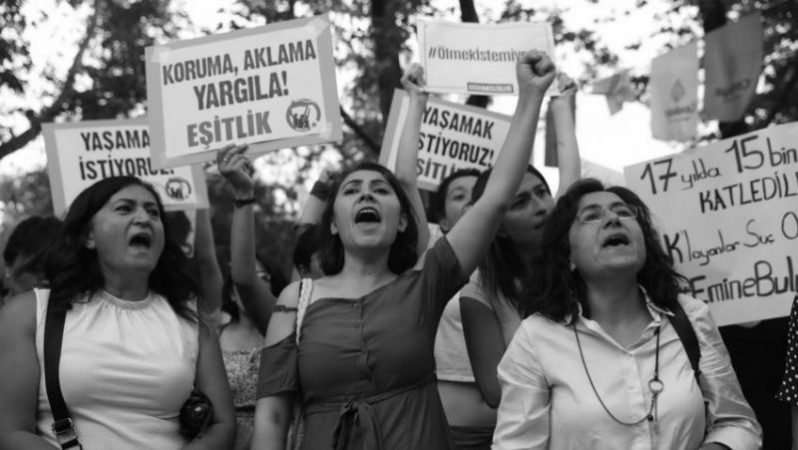The Anti-Femicide Movement in Turkey

The past week saw the timelines and explore pages of our social media coloured black and white from the photos of women tagged #challengeaccepted. The awareness campaign is more than just a display of respect and affection by women towards other women. The reason runs much deeper and is much gimmer. It is an online campaign that stems from the ongoing protests in Turkey against its long history of cold-blooded Femicides.
To be precise, the Oxford dictionary defines Femicide as “Killing of a woman, in particular by a man and on account of her gender.” The movement in Turkey has boiled over recently and gained momentum due to two main reasons. First, the ruthless murder of a twenty-seven-year-old university student, Pinar Gultekin from the Aegean province of Mugla. Her former boyfriend, Cemal Metin Avcis claimed to have killed her in a fit of rage as she threatened to expose their relationship to his wife and asked for money to keep his secret safe. She was strangled, burned and later stuffed in a bin with concrete poured over her body. The second reason is that the Turkish Government is currently considering to withdraw from the Istanbul Convention, a comprehensive set of international law regarding violence against women.
The two events occurring together has sparked the huge wave of dissent among women Rights groups in the country who have campaigned many times but each time, they were brutally suppressed by the Government. This has been going on from back on November 25 2019, when 2,000 women gathered in Istanbul to protest marking the International Day for the elimination of violence against women before they were dispersed by the angry and violent authorities. Recently, the protests in Izmir, a coastal Metropolis cried out slogans such as, “we want to live” before they were similarly pelted with rubber bullets and tear gas. There are two main demands and aspirations of these groups from the government. They want the proper of implementation Istanbul Convention as well as the proper application and reformation of existing laws on domestic violence against women.

Istanbul Convention has been a long-contested law in the country. Turkey had been the first country to sign it back in 2011 but it has yet to implement it properly. Recently there has been a huge push from the religious forces for withdrawal. They deem the convention to be a huge threat to the traditions of the country. The most prominent person to back these claims is Ebru Asiturk, the spokeswoman of women’s affairs of the religious conservative Saadet Party and the AKP deputy chair Numan Kurtulmuş. Spokeswoman Asiturk has said that the Istanbul Convention violates the article 41 of the Turkish Constitution which protects the unity of the family and AKP deputy chair Kurtulmuş reduced the Istanbul Convention as being “very wrong” and “played into the hands of LGBT and marginal elements” in Turkish society. These statements come in the light of the accusation of the Istanbul Convention to be the reason of increasing divorce rates throughout the country.
The laws which the Turkish government has in place on violence against women often seem hollow because they are not efficiently used by the authority. The laws say that the afflicted woman has to be given protection within twenty-four hours without evidence and the man will be given a restraining order for six months. Along with this, there are also provisions for shelter for women provided by Governmental bodies, NGOs or local administrative bodies. There will also be protective measures, psychological assistance and economic support for the women and children. Usually, the restraining order is the only things the authorities do with none of the further actions being taken. As for the man, the sentences they get are usually lenient and depend mostly on his appearance which is considered as a medium to sway the judges. If the man comes across as religious and well dressed, his sentence is severely reduced. This practice has been given the name of ‘tie reduction’. There is also a practice of conditional release which has to be reformed where the accused is granted bail before his term without informing the abused woman. In many such cases, the released man goes back and further harms or assaults the woman before surrendering.
The Turkish President Tayyip Erdogan has expressed condolences regarding the brutal murder of Pinar Gultekin. But these condolences seem hollow in the light of repressing of protest movements and the consideration of withdrawing from Istanbul Convention. He has also earlier claimed that women by no means are equal to men. The majority party, AKP has also been very vocal about making adultery a criminal offence, equating abortion to murder and defining women who would rather work than take on maternity roles as half persons. The Turkish government has also notoriously banned International women’s day marches, closed shelters for women and also unleashing a crackdown against women’s organisations and movements. This has been never tolerated by the campaign groups like “We Will Stop Femicide” who have been very vocal regarding these issues in the country and has been spearheading the movement to implement Istanbul Convention and reformation of existing laws against Femicide.
According to the statistics published by the Quint, in the year 2019 alone, there were 474 victims of femicide, which is a 200% increase from 2013 when the number was 237. The numbers are further set to increase with the current coronavirus Pandemic and the resulting lockdown and economic slowdown. When the government is refusing to acknowledge the issue and is brutally repressing dissent in the name of a discriminatory and sexist discourse, the situation becomes heated up in the country, the tremors of which can be felt internationally.



















